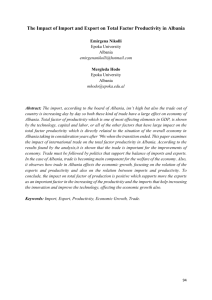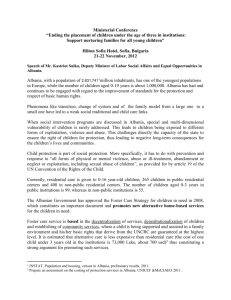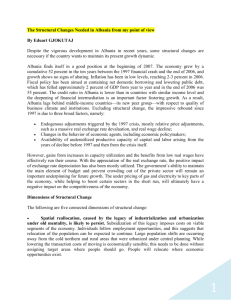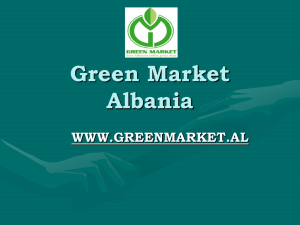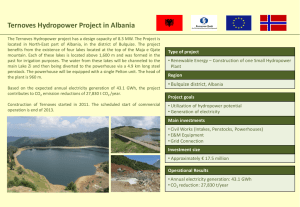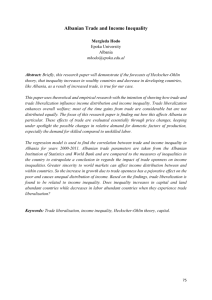DOC - Europa
advertisement
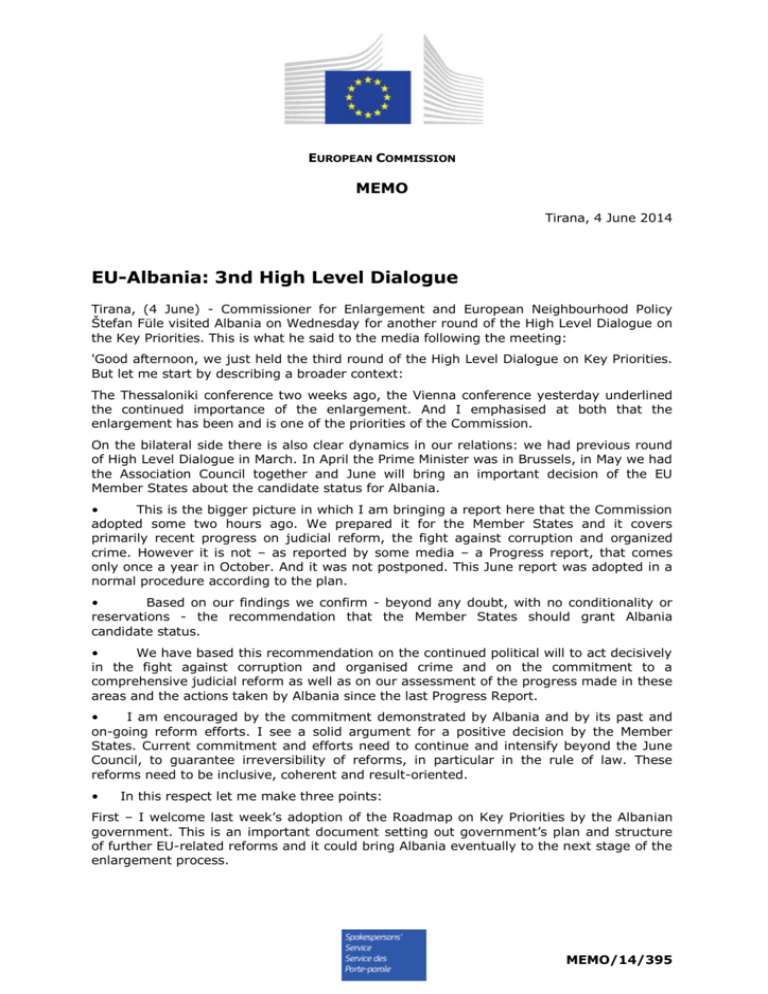
EUROPEAN COMMISSION MEMO Tirana, 4 June 2014 EU-Albania: 3nd High Level Dialogue Tirana, (4 June) - Commissioner for Enlargement and European Neighbourhood Policy Štefan Füle visited Albania on Wednesday for another round of the High Level Dialogue on the Key Priorities. This is what he said to the media following the meeting: 'Good afternoon, we just held the third round of the High Level Dialogue on Key Priorities. But let me start by describing a broader context: The Thessaloniki conference two weeks ago, the Vienna conference yesterday underlined the continued importance of the enlargement. And I emphasised at both that the enlargement has been and is one of the priorities of the Commission. On the bilateral side there is also clear dynamics in our relations: we had previous round of High Level Dialogue in March. In April the Prime Minister was in Brussels, in May we had the Association Council together and June will bring an important decision of the EU Member States about the candidate status for Albania. • This is the bigger picture in which I am bringing a report here that the Commission adopted some two hours ago. We prepared it for the Member States and it covers primarily recent progress on judicial reform, the fight against corruption and organized crime. However it is not – as reported by some media – a Progress report, that comes only once a year in October. And it was not postponed. This June report was adopted in a normal procedure according to the plan. • Based on our findings we confirm - beyond any doubt, with no conditionality or reservations - the recommendation that the Member States should grant Albania candidate status. • We have based this recommendation on the continued political will to act decisively in the fight against corruption and organised crime and on the commitment to a comprehensive judicial reform as well as on our assessment of the progress made in these areas and the actions taken by Albania since the last Progress Report. • I am encouraged by the commitment demonstrated by Albania and by its past and on-going reform efforts. I see a solid argument for a positive decision by the Member States. Current commitment and efforts need to continue and intensify beyond the June Council, to guarantee irreversibility of reforms, in particular in the rule of law. These reforms need to be inclusive, coherent and result-oriented. • In this respect let me make three points: First – I welcome last week’s adoption of the Roadmap on Key Priorities by the Albanian government. This is an important document setting out government’s plan and structure of further EU-related reforms and it could bring Albania eventually to the next stage of the enlargement process. MEMO/14/395 I also welcome the intention of the Government to establish and hold soon the first session of the National Council of European Integration to bring all the stakeholders on EU- related issues together. Inclusiveness and cooperation is essential for the success of your integration ambitions. Second – In this context I need to tell you that the on-going confrontational political climate damages Albania's image and may hinder the reform process. Both government and opposition must show moderation and interact constructively in a compromise-based approach. Third – on the hunger strike of dismissed officials: I am aware of it and see it with concern. I am calling on hunger strikers not to put their health and lives at risk. We are following those issues closely and raise it regularly with the government and we will keep on doing so. Finally, I firmly believe that Albania's future is within the EU and I remain strongly convinced of Albania's capacity to tackle its EU integration challenges. We remain committed to work together with Albania and help the country in its EU integration process. Thank you!' Joint Conclusions of the third High Level Dialogue on the Key Priorities 1) Prime Minister Edi Rama and Commissioner Štefan Füle chaired the third Meeting of the High Level Dialogue (HLD) on the Key Priorities between Albania and the European Commission on 4 June 2014. The plenary session included the participation of Government Ministers, as well as of an extended participation of the opposition through the chair of the parliamentary committee for European integration, and two additional Members of Parliament. 2) The focus of the meeting was on the findings of the Commission's "Report on Albania’s Progress in the Fight Against Corruption and Organised Crime and in the Judicial Reform." In line with the Council's request of December 2013 the report covers primarily the fight against corruption and organized crime and judicial reform and highlights some additional key developments in areas, which are important for Albania EU integration. 3) Commissioner Füle praised Albania's continued political will to act decisively in the prevention and fight against corruption and highlighted that structural reforms testify to an all-encompassing approach including a wide range of institutions. Important legislative reforms introduced in the fight against organised crime and investigations have yielded positive results in the fight against drug trafficking and other areas of serious and organised crime. Moreover, Commissioner Füle underlined Albania's commitment to judicial reform, notably by working with the Venice Commission to improve the independence, accountability and professionalism of the system. In this context, he welcomed the government’s presentation of its vision for a comprehensive reform focusing on reforming the main judiciary institutions and the organisation and functioning of the judiciary through an inclusive process involving all the main stakeholders in the justice system, including Parliament and the civil society. 4) On the basis of the findings of this Report, the Commissioner confirmed the Commission's recommendation that the Council should grant Albania candidate status. Prime Minister Edi Rama welcomed this and confirmed his government's commitment to further strengthen the considerable progress achieved in EU-related reforms, in particular to continue the implementation of reforms in the area of the rule of law, including anticorruption policy, judicial reform, and fight against organised crime. He referred to the adoption of the roadmap on the five Key Priorities, which need to be addressed for the 2 Commission to recommend the opening of accession negotiations, and promised its solid and timely implementation. 5) In line with the Roadmap, the Albanian side also provided a brief update on its planned actions for further addressing the five Key Priorities. The Commissioner underlined the importance of the Roadmap for outlining the next steps needed to bring Albania forward on its European integration path. To support this work, it was decided to strengthen the consultations between the government and the European Commission on the implementation of each key priority. 6) Commissioner Füle underlined that the Commission stands ready to support Albania's reform efforts with expertise and financial support. 7) The Albanian Government confirmed its commitment to a constructive and sustainable political dialogue with the opposition which is vital for the sustainability of the reform process. In this context, the Albanian Government briefly explained the modalities for establishing a National Council for European Integration. The Albanian Government confirmed that the first meeting of the National Council for European Integration will take place on 29 July 2014. 8) It was agreed that to prepare for the next meeting of the HLD foreseen for September 2014 regular contacts on working level will continue and that Albania will provide reports on a regular basis on the implementation of the roadmap, which was adopted by the Council of Ministers on 28 May. Commissioner Füle underlined the need for Albania to remain focused and continue delivering results as regards the five Key Priorities in view of the assessment of the Commission in its October Progress Report. 3


